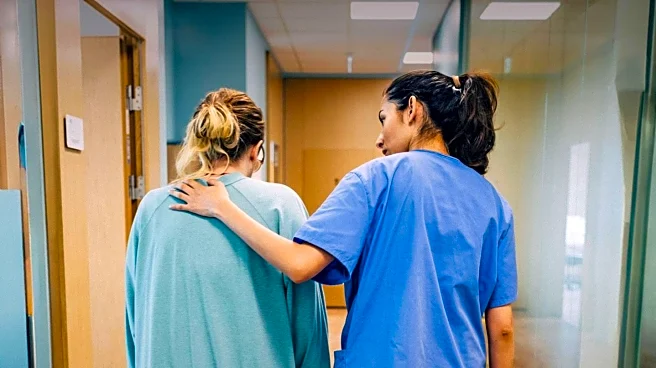What's Happening?
Rabin Medical Center is currently managing the rehabilitation of hostages recently released from captivity in Gaza. Some hostages have been discharged and returned home, while others remain under close
medical supervision. The decision-making process regarding the release of hostages from hospitals is influenced by individual health assessments and recovery needs. Nimrod Cohen, one of the released hostages, was photographed arriving at Ichilov Hospital in Tel Aviv on October 13, 2025. The medical center is focused on providing tailored care to ensure the well-being of each individual, considering the physical and psychological impacts of their captivity.
Why It's Important?
The rehabilitation of hostages is crucial not only for their personal recovery but also for the broader societal healing process. The medical decisions made by Rabin Medical Center highlight the complexities involved in treating individuals who have experienced trauma. This situation underscores the importance of specialized healthcare services in addressing the needs of those affected by conflict. The ongoing demonstrations in Tel Aviv demanding the return of hostages reflect the public's concern and the emotional toll on families and communities. The medical center's approach may set a precedent for handling similar cases in the future, emphasizing the need for comprehensive care in post-conflict scenarios.
What's Next?
As the situation develops, Rabin Medical Center will continue to monitor the health of the remaining hostages under their care. The center may face challenges in balancing the immediate medical needs with long-term rehabilitation strategies. Public pressure and advocacy for the return of hostages are likely to persist, potentially influencing political and diplomatic efforts. The medical community may also engage in discussions on best practices for treating individuals who have endured captivity, contributing to the development of guidelines for future incidents.
Beyond the Headlines
The ethical considerations surrounding the treatment and release of hostages from medical facilities are significant. Healthcare providers must navigate the delicate balance between patient confidentiality and public interest. The situation raises questions about the role of medical institutions in conflict resolution and their responsibility to support affected individuals beyond physical health. Long-term psychological support and community reintegration programs may become essential components of the rehabilitation process, highlighting the need for interdisciplinary collaboration in addressing the aftermath of hostage situations.









